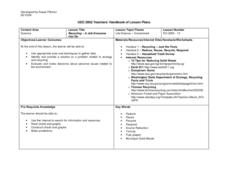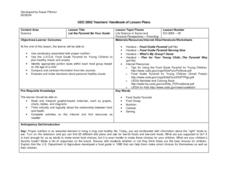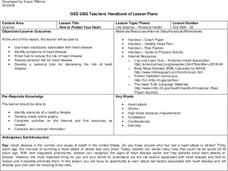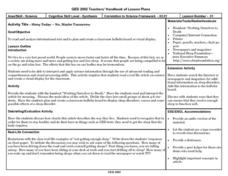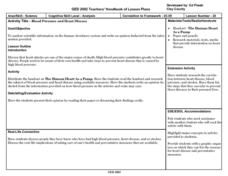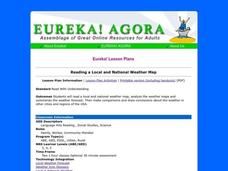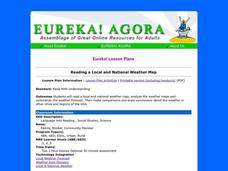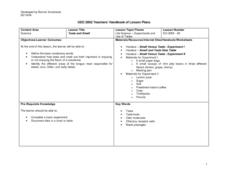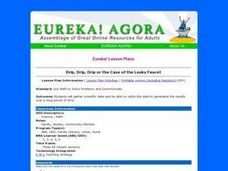Curated OER
Summer Science Recipes: Experiments on the Grill and in the Kitchen
Generate ideas about the most scientifically sound ways to prepare foods safely and efficiently during the summer season. Learners will use the GED Connection Science Workbook, so they can practice the skills needed to prepare for the...
Curated OER
Mixing in the Kitchen
Learners identify the different types of mixtures. They identify examples of solutions, suspensions, colloidal dispersions, and emulsions through a game and basic experiments.
Curated OER
"We're Back ... Eagles Soar!"
Young scholars use information from Internet websites to create a map of where Bald Eagle habitats can be found after being familiarized with the map by the instructor.
Curated OER
Raising a Healthy Child
Students identify key features in promoting their child's health. They create their own health and wellness plan for their Students.
Curated OER
Recycling
Pupils examine the impact of recycling on the economy and environment. They develop a recycling plan for their own community in order to solve recycling problems.
Curated OER
Recycling - A Job Everyone Can Do
Young scholars research recycling effort that take place in the US. They play an online game and complete handouts using Internet research.
Curated OER
Food Pyramid Menu
Students analyze the food pyramid. In this food pyramid lesson plan, students evaluate their nutritional needs. Students record their eating habits and determine if their food choices were healthy.
Curated OER
Reading a Local and National Weather Map
Young scholars investigate weather maps. In this weather lesson, students discover the meaning of different weather icons and symbols. Working independently, young scholars use the local forecast to correctly label a state map.
Curated OER
Let the Pyramid Be Your Guide
Students chart foods on the food guide pyramid and design nutritional food plans that include all the food groups.
Curated OER
How to Protect Your Heart
Learners examine risk factors associated with heart disease and develop their own personal plans for decreasing the risk of heart disease.
Curated OER
Sleep Today - No, Maybe Tomorrow
Learners read and interpret handout about sleeping habits and disorders, and plan and create classroom bulletin board that displays causes, disorders and effects of sleep deprivation.
Curated OER
Blood Pressure and Heart Disease
Students explore the major causes of heat attacks as the topics of the human circulatory system, blood pressure, heart disease, arteries and veins are examined. Opinions on the topics are developed as researched material is presented to...
Curated OER
Reading a Local and National Weather Map
Students practice reading a national and local weather map. Using this information, they work together to make predictions about the weather for the next few days. They discuss the use of symbols and maps as a class and discuss how...
Curated OER
Reading a Local and National Weather Map
Students examine weather maps. They examine icons and map symbols. Students explore vocabulary words related to weather. Students analyze and evaluate information provided on the weather map.
Curated OER
Will It Rain Today or Tomorrow?
Students examine how to forecast weather. They examine the different types of weather and learn the correct vocabulary.
Curated OER
The Impact of Disease on our Lives
Learners explore infectious diseases. They analyze the effect of a disease on the community. Students develop a public health policy that addresses the containment of the epidemic. Learners create a policy and present findings as part...
Curated OER
The Solar System
Students research origin of solar system, discuss theories they have found, and create paper mache solar system models.
Curated OER
Taste and Smell
Young scholars experiment with sense of smell, and how it relates to sense of taste.
Curated OER
Weather Maps
Students interpret information on a weather map in order to construct a graph, and discuss how the weather impacts their lives.
Curated OER
Drip, Drip, Drip
Learners gather scientific data and be able to utilize the data to generalize results over a long period of time. They use the appropriate tools to measure quanities of liquids and analyze the data to determine the cost of a leaky faucet.







